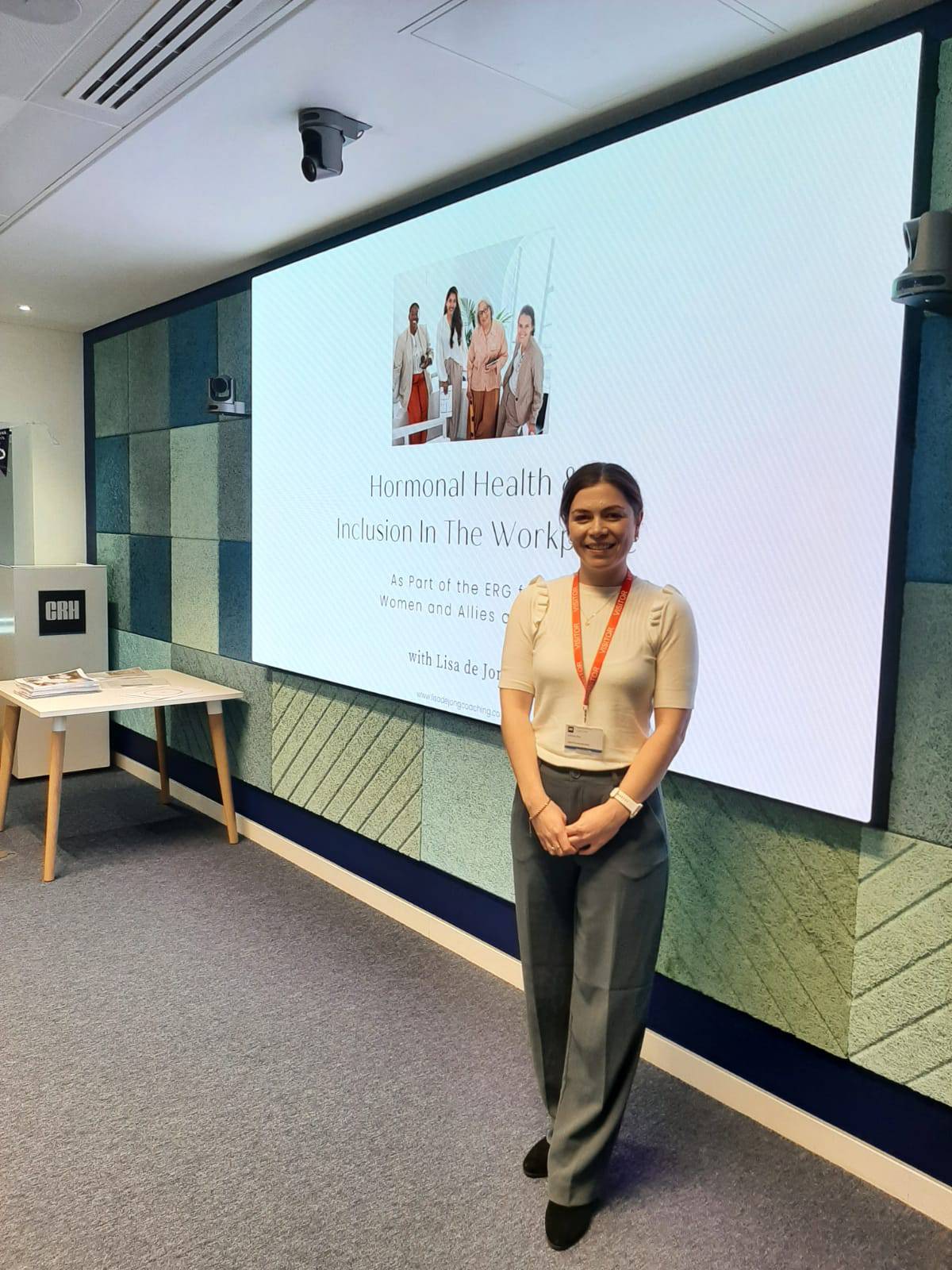Lisa de Jong is a women’s health educator, coach, and founder of the Menstrual Coach Academy and Menstrual Cycle Mastery. Her work bridges menstrual health, trauma-informed coaching, and the mind-body connection to help women transform their relationship with pain, their cycles, and themselves. What began as her own journey with endometriosis and chronic period pain has evolved into a global mission to redefine how women experience their bodies.
Through her courses, podcast, and coaching programs, Lisa guides women to understand their nervous systems, release fear, and build compassionate self-awareness. Her approach goes beyond symptom relief—it’s about empowerment, emotional healing, and reclaiming agency over one’s body.
We sat down with her to explore how awareness, curiosity, and nervous system healing can change the way we live, work, and connect with our feminine energy.

Website
Turning Struggle into Strength
Your work began from your own lived experience with chronic period pain and endometriosis. Can you share a defining moment when you realized that your personal challenges could transform into a professional mission to help others?
Lisa: In the early days of my healing journey, I started meditating. This was long before it became mainstream. One evening, just before heading out to my brother’s engagement dinner, I decided to try something new: a womb meditation. I was dressed up, makeup on, ready to go, but I had a few minutes to spare, and so I sat back down to meditate.
As I focused on that part of my body, tears suddenly began streaming down my face. In that moment, I realized I had been carrying so much grief in my womb for years. I could see clearly that I resented my cycle, hated my womb, and month after month, secretly wished it away. That moment cracked something open for me. It deepened my curiosity and set me on a path of learning—first through Menstrual Cycle Awareness, then other healing modalities.
At the time, I was already working as a teacher in international schools with adults, so sharing knowledge felt natural to me. A friend encouraged me to post a menstrual cycle workshop on Meetup.com. I went for it, booked a yoga studio in Dublin, and to my surprise, the workshop sold out on the very first night.
From there, things began to grow and evolve organically. I trained further, began gaining experience with both groups and one-to-one clients, and gradually realized that what started as my own healing journey was becoming a much bigger mission to support others.
I set up my own coaching practice, followed by online courses, and those then eventually led to training professionals as my own clients wanted to learn this from me.
Chronic Pain & Daily Life
Chronic menstrual pain can affect work, relationships, and overall well-being. What strategies do you suggest for women to manage daily life while navigating ongoing pain?
Lisa: As I work mainly with pain science and the mind-body connection, I teach women how to direct their thoughts so their sympathetic nervous system isn’t firing all day long. A lot of my students talk about feeling fear and anticipating pain or symptoms before they even arrive. They often struggle to simply ‘be with’ themselves in the moments when pain isn’t there.
I share many tools to help with this—what I call ‘Body-Genius’ tools because it’s a lot of internal work and nervous system regulation. Alongside that, I also teach about self-care, balancing hormones through diet, menstrual cycle awareness, emotional empowerment, and more. It’s about giving women a toolkit and new skills they can draw on every day to support themselves while living with ongoing pain and healing through it.

Mind-Body Connection
You integrate trauma-informed coaching with menstrual cycle knowledge. How does understanding this connection empower women to take control of their health and wellbeing?
Lisa: Traditional coaching often focuses heavily on mindset—things like willpower, new routines, habits, and goals. The problem is, it can overlook the emotional and nervous system component. For example, I see clients who struggle to care for themselves when they’re suffering. Instead, they might numb out with TV or food, then spiral into negative self-talk. A trauma-informed approach looks at this pattern with curiosity rather than judgment. Maybe the client’s system is overwhelmed, or maybe they were never shown what healthy self-care looked like growing up. The nervous system is always meeting an underlying need. If I simply hand over a self-care checklist, it usually won’t stick. But when we first unravel the blocks within the nervous system, the healthy actions naturally feel easier and more sustainable.
Many of my clients also carry a history of trauma. Unhealed trauma often leaves the nervous system stuck in fight, flight, or freeze mode. When we’re living from those states, our body is in survival mode, and life force energy is pulled away from digestion, reproduction, and prioritised to fuel the heart, lungs, and muscles. Over time, this drains our life-force energy. A trauma-informed approach helps restore that energy and bring the body back into a rest-and-digest state, where true healing can happen. This is vital in the chronic pain space, because we simply can’t heal if we’re constantly in a trauma response.
I’ve also come to see the lack of support and even the shame that many young girls experience around their menstrual cycle as a kind of relational trauma in itself. I notice many clients’ nervous systems get triggered into fear at the sight or thought of their period, with instant associations of pain or worry. Trauma-informed coaching helps to rewire this relationship with the cycle, shifting it from fear into one of safety, understanding, and compassion.

Debunking Period Myths
What are the most common misconceptions you encounter about menstrual health, and how do you guide people to reclaim agency over their bodies?
Lisa: Some of the most common misconceptions I hear are that periods are supposed to be painful, that healing has to be hard work or demand a complete lifestyle overhaul, or that diet and supplements alone can “fix” everything. Others swing to extremes, like believing doctors are always right or that doctors are always wrong. The pill is good. The pill is bad. Even the idea that you need to love your period in order to heal. There are so many myths, and many of them even contradict one another.
What I remind my clients and students is this: your power comes from awareness and choice. Question the messages you’ve absorbed from industries, systems, and outside influences. Know that your agency lies in having options, information, and the ability to decide what works for you. I often encourage women to prepare ahead for doctor’s appointments, and remind them they’re fully entitled to bring an advocate if it feels difficult to go alone.
At the end of the day, there is no single “right” way with this work. My role is to support clients and groups in returning to presence, listening inwardly, and finding their own inner compass. That’s where true agency lives.

Cycle-Aware Mental Health
Women experience anxiety, mood swings, or depression linked to hormonal cycles. What strategies do you recommend to support mental health alongside menstrual health?
Lisa: I always start by teaching women how to understand and regulate their nervous system around their cycle. And this doesn’t have to mean adding brand-new routines or protocols. The key is to notice what you’re already doing that helps you feel calm or grounded, and lean into those things. It might be as simple as putting on music while tidying the kitchen, or sitting down with a cup of tea to paint your nails. Small, consistent acts of self-care can be incredibly powerful.
From there, I bring in the practice of Menstrual Cycle Awareness. One of the main reasons we struggle is because we suppress or resist the more vulnerable emotions that arise, especially in the luteal phase, the week before menstruation. With cycle awareness, we learn to build intimacy with ourselves in every phase. Over time, this helps the nervous system become less reactive and more relaxed, even during the difficult premenstrual days.
On a very practical level, I also look at diet and sleep. There’s often a lot of low-hanging fruit here like making sure you’re eating enough overall, balancing protein, fats, and carbs, and getting enough fibre, iron, and B vitamins to support hormonal health. Sleep is equally vital since our circadian rhythm is closely tied to the endocrine system. Something as simple as getting daylight first thing in the morning can help regulate your sleep cycle quickly and make a big difference in mental health.

Personal & Story-Oriented:
From your experience, how has working with the nervous system helped your clients transform their relationship with chronic pain or menstrual challenges?
Lisa: From my experience, it’s very difficult to make long-term, sustainable changes without working with the nervous system as the foundation. If the work itself is approached in a stressful way, it often cancels out the healing. I’ve had clients who focused primarily on calming their nervous system—shifting their thinking, rewiring their brain, and softening fear responses—and from there, their pain eased dramatically without needing major lifestyle changes.
This has been true in my own journey as well. For years, I stressed about having the “perfect” clean diet and panicked whenever symptoms returned, convinced I had failed and needed to start over. Now, by focusing on pain science, nervous system regulation, and my thoughts, I rarely experience chronic pain. And when it does show up, I know exactly how to respond and how to meet myself with presence and compassion instead of fear.
I’m so proud of this approach to chronic pain because it changes lives. I’ve seen clients go from being stuck in cycles of pain and fear to living fully again—earning a living, building relationships, walking with friends, eating ice cream without guilt, even traveling without worry. It’s not just about reducing pain; it’s about reclaiming their lives and feeling more present with themselves and their loved ones. That transformation is what makes this work so deeply rewarding.

Future Vision
Looking ahead, what changes do you hope to see in the way women’s health, mental wellbeing, and chronic pain are understood and supported globally?
Lisa: I’m super excited about growing the Menstrual Coach Academy. We’re already active in many countries around the world, and I’ll soon be hiring new facilitators to help expand this work even further. I’m also thrilled about my upcoming membership, the Menstrual Mastery Collective—a space where women can learn and practice these skills with me, receive coaching, and connect with others who are on the same journey.
Looking more broadly, I hope to see global conversations around chronic pain, PMDD, and endometriosis shift to include trauma and emotions as key factors in the strain on the nervous system. If this perspective becomes normalized and destigmatized, healing could become far more accessible and effective for so many people.

Editor’s Note
Lisa de Jong opens a path to understanding our bodies, cycles, and the deep intelligence within. Her work is a lesson in presence—navigating pain, emotion, and fear with curiosity and compassion, and discovering that empowerment grows when we honor ourselves fully. Through cycle awareness, nervous system work, and self-care, Lisa shows that reclaiming our relationship with our bodies is not just healing—it’s liberation.
For anyone living with chronic pain, menstrual struggles, or the weight of societal expectations, her story is an invitation: to listen deeply, act with care, and embrace each phase of life with agency and grace.
“True mastery is less about controlling your body and more about understanding it—presence, awareness, and the courage to meet yourself fully.”

